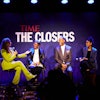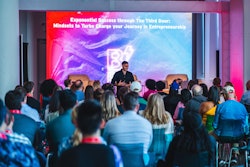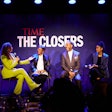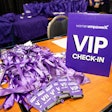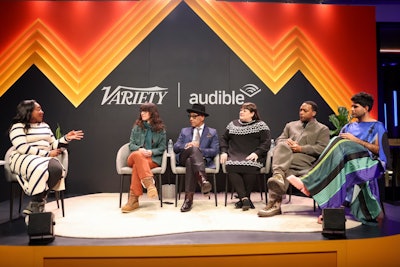
Let's face it: The right moderator can make or break a panel discussion. A skilled one can enhance the audience's experience and elevate the dynamics of the entire panel, transforming a simple discussion into an insightful exchange. On the flip side, the wrong choice can sap the energy from the room, leading to uninspiring conversations or discussions overly dominated by the moderator’s own viewpoints.
"I think of a moderator as a late-night talk show host," says Alyson Buck, senior director and head of strategic PR for Samsung Electronics America. "They need to be nimble to keep the conversation moving, humorous and entertaining to keep the audience engaged, and be able to walk a fine line between adding to the conversation but not taking away from it by overshadowing the panelists. It's not easy!"
Where Can I Find a Good Event Moderator?
Here's where Buck and some other top industry professionals like to look for moderators:1. Lean on industry connections and research.
Kristen Hubbard, senior manager of content and learning for Nth Degree Events, suggests turning to online research, professional networks, and advisory committees. These resources can help identify individuals with relevant experience and a proven track record in moderating.
"Referrals from past events, recommendations from trusted colleagues, and even observing moderators in action at other conferences are also part of my selection process,” agrees Derek Brake, senior vice president of strategic initiatives and business development at IFP Communications.
2. Consider people with backgrounds in journalism or academia.
“A cohort we often tap is current or former journalists, especially lifestyle editors or former business press,” explains Buck. “They are used to interviewing subjects so can help shape intriguing questions, and they bring a wealth of knowledge to add industry perspective to the topic at hand.”
Academia can be another rich source. “Individuals who are in academics who can successfully engage with audiences are also people who can make good moderators,” says Hubbard.
3. Tap internal talent.
Don't overlook the potential within your own organization, adds Buck—especially if budget is a factor. “This is a good opportunity to tap emerging talent and show a fresh face.” But, she cautions, moderation is not typically a role for an executive, who might overshadow the panelists. “You want them to have a forum to give their unique POV and show expertise, which is hard to balance in a moderator role.”
4. Look for personal connections.
Brake likes to choose moderators who have a personal or professional connection with at least one of the panelists. “This connection helps create a more relaxed and natural conversation, putting panelists at ease and fostering a comfortable atmosphere for authentic dialogue,” he says.
5. Think outside the box!
Sometimes, looking outside the industry your event is focused on can bring a fresh perspective—as long as the moderator does their homework. “Moderators from different fields bring fresh perspectives and are more likely to ask unconventional or unexpected questions, which often lead to more engaging and thought-provoking discussions,” says Brake.
What Are Some Skills and Qualities I Should Be Looking For?
When choosing a moderator, always consider the event’s objectives, audience demographics, and the potential moderator’s skill set, advises Tricia Richards-Service, founder and president of the online speaker directory I Need A Speaker. “In my opinion, great moderators are conversation conductors who masterfully balance multiple goals,” she says. “They're quick thinkers who can respond with follow-up questions, minimize discussion monopolization, and ask thoughtful questions that reveal deeper insights.”Richards-Service likes to think of panels as guided discussions rather than simple Q&As. “[Moderators are] not just passing a microphone from speaker to speaker, but actively listening, synthesizing complex ideas, and creating space for diverse perspectives,” she explains. “Their job is to ensure every participant has a meaningful opportunity to contribute while maintaining an engaging, fluid conversation that stays true to the event's purpose.”
So what are some skills you should look for?
1. The Ability to Share the Spotlight
Tawanda Carlton, chief operating officer of TENET Consultancy, emphasizes the importance of a moderator who enhances rather than dominates. “A great moderator ensures the spotlight stays on the panelists, guiding the discussion without overpowering it,” she says.
“Some of my clients excel in their fields but shine more as panelists because they prefer to share their personal stories or insights rather than steer a conversation,” she adds. “On the other hand, clients who can think quickly on their feet, adapt to shifting dynamics, and keep the energy flowing often make phenomenal moderators.”
2. Good Energy
“A great moderator sets the tone early, creating a comfortable and inviting atmosphere for both the panelists and the audience,” says Carlton.
Brake agrees, noting that a strong stage presence is essential for audience engagement—as is a natural curiosity. "Someone who is authentically interested in the topic or industry can bring energy and passion to the conversation, making it more compelling for both panelists and attendees," he says, adding: “Use humor and warmth to ease tension, build rapport, and make the conversation feel lively and spontaneous."
3. A Clear and Concise Speaking Style
“Moderators that overexplain or ask questions in a roundabout way typically don’t do as well,” says Hubbard, noting she looks for “a calming demeanor that makes the panelists or interviewee feel comfortable, [and a] dynamic presence that doesn’t overwhelm or overshadow the content area experts that are being asked the question.”
Another important note? "Typically, you want moderators to remain neutral and not take sides during a conversation that has opposing points of view,” she adds.
4. A Willingness to Prepare
Preparation is key. “A skilled moderator does their homework—not just on the panel topic but also on the panelists, crafting questions that highlight their expertise and encourage engaging dialogue,” says Carlton.
Brake agrees, emphasizing the need for preparing questions that prompt deeper insight: “[The best moderators] ask open-ended, thought-provoking questions that encourage panelists to elaborate on their points and spark meaningful dialogue,” he says. “They draw connections between panelists' responses, finding common threads, and highlighting contrasts to deepen the discussion.”
5. Active Listening Skills
Active listening is crucial for effective moderation. Carlton stresses, “[Good moderators] respond to what’s being said in the moment, asking follow-up questions that deepen the conversation—and they ensure all panelists have equal opportunities to contribute, even when some are more reserved.”
Hubbard adds, “Throughout the conversation, they should ask open-ended questions and be able to take what multiple people say and effectively summarize it or extract key points to tie everything together.”
6. An Interest in Audience Engagement
Effective moderators work to connect the panel with the audience. To Brake, the best moderators "keep the audience engaged, sometimes even posing direct questions to attendees to maintain interaction," he says. "Pay attention to the audience’s reactions and pivot if the energy dips or a particular topic resonates more strongly.”
Remember that audiences are there to get insight into a specific area. “The best moderators do not let the conversation get sidetracked and are able to redirect conversations that go off track,” says Hubbard. “If audience expectations are not met because a conversation was derailed it can be detrimental to the experience.”
7. Time Management Skills
“Flow, timing, and transitions are also key to help move a conversation. Dead space or clunky transitions from one question or topics to another can throw off a discussion,” adds Hubbard, noting that keeping the conversation moving and not letting a specific panel member dominate the conversation—but also letting panelists bounce off each other’s ideas—is important.
Brake agrees. “Staying mindful of time and ensuring all planned topics are covered while allowing room for organic discussion is a key skill,” he says.



